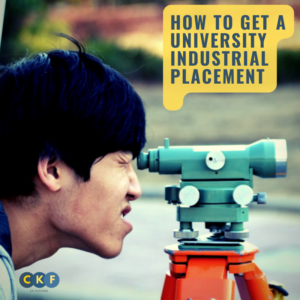 So, what is an Industrial Placement?
So, what is an Industrial Placement?
If you’re in your 2nd year of university then you may have been considering a placement year for a while now. Whether you’re still weighing up your options or trying to boost your application, this article should help you out. An Industrial Placement is a gap in your studies where you work in a professional environment for 9-12 months in your third year. Not only is it a great opportunity to get graduate-level work experience before your final year, but you’ll also pay a fraction of the tuition fees and get paid a salary (typically £20K+pa).
Many major companies take on placement students and have structured, tried and tested programmes in place which give you a chance to put your academic knowledge into practice – working, earning and learning alongside the professionals. You could also work abroad; now that’s a thought….
5 reasons why doing a university placement is a good idea:
A placement year is a great way to earn enough money to stockpile alcohol (or text books, depending on your priorities) for your final year. Here’s 5 more sensible and long-term reasons why it’s a great idea to do a placement year:
-
- The labour market is becoming increasingly competitive with more people attending university and getting first-degree honours – so standing out amongst the crowd requires showing initiative and interest in finding good work experience to develop your CV, skills, and confidence. An Industrial Placement year gives you the chance to put your knowledge into practice, learn specific technical skills, and develop as an individual and a professional.
- You are more likely to do well in your final year – A study by Aysha Divan (Associate Professor, University of Leeds 2022) showed that 43.1% of 26,000 students who did a placement year achieved a first, compared to 22.8% of those who did not. This huge difference speaks to the effects of working with professionals and what it can do for your motivation, maturity, and knowledge.
- Networking – Career success is often attributed to meeting the right people and yes, there is an element of luck here; however, it’s up to you to increase your chances of meeting people whom you can have mutually beneficial long-term relationships with. The list of benefits of good networking is enormous in your life and career, and whilst you’re still at Uni is a great time to start.
- It’s an opportunity to try out a career path – A placement year will give you insight into what life in that industry may look like and the type of department and working culture that suits you. This hopefully will be an inspiring experience, but it may also make you realise your skills are more useful elsewhere.
- The mixture of having a better CV, higher grades, real graduate-level work experience and general maturity, makes employers more likely to hire students who did a placement.
Things to consider:
You may be thinking, why would anyone not do a placement year? But as it turns out, there are many things to consider before leaping into it:
- Your 1st year grade – Most placements don’t specify a grade requirement; however, your 1st-year grade will always be taken into consideration and if you got a 2:2 or a third, you’ll have to truly impress in other areas to land the best jobs. If this applies to you, maybe now would be a good time to become Treasurer of the Ping Pong Society.
- Social life/well-being – Your decision may depend on your friendship groups, accommodation choices and only you can decide what’s best for you. If you’re studying business but all your close mates you want to share a house with are on a 3-year philosophy degree, you may want to stick with them. You may have other ‘stuff’ going on in your life and feel like it’s not the right time for change. For some people, you may just not feel ready for it, or want to concentrate on finishing your degree. The main thing is to do what’s right for you, and if you’re not sure – talking with your tutor may help you.
- Balancing applications with 2nd-year studies – As if uni work isn’t already difficult enough, you’ll have to be on top of multiple applications including interview preparation while also studying for exams.
- Other factors to consider are:
-
-
-
-
- Accommodation
- Finance
- Location – a London job may sound great – can you afford to live there?
- Is the job related to your degree?
you don’t have to get a job related to your degree, but there isn’t much point doing a placement unless you’re confident that you’re going to learn something valuable from it
-
-
-
Placement vs internship?
Placements differ from internships in a few ways. The main difference is that a placement year is part of your university degree, adds an extra year to your studies and often includes a little bit of academic assessment alongside your work.
Internships are not part of your course because they are taken over the summer holidays and can last anywhere from 4 weeks to 4 months. Internships still serve as a great opportunity to get insight into multiple aspects of a company including its software and hardware, culture, and general business operations. Deciding which one is better for you comes down to whether you want a more in-depth experience that adds a year to your graduation date or a summer job where you’ll get a less thorough, yet still valuable work experience.
How to find an industrial placement
There are two main ways of finding an industrial placement – structured and speculative applications.
-
-
-
-
- Structured applications include:
- An allocated placement given to you by the university (only happens if it’s a 4-year course) – otherwise, it’s down to you
- Your university’s career service may have structured ways for students to apply
Websites to check out:
https://www.ratemyplacement.co.uk
https://www.e4s.co.uk/jobs/3-industrial-placements.htm
https://uk.indeed.com
Prospects
https://www.beetroot.com/work-placements/employers/
-
-
-
Speculative placements are where you approach an organisation that isn’t advertising a placement job. These are less likely to be successful of course but are definitely worth a shot if you find a company you love and think you could genuinely add to. The best way to approach these applications is by looking at the company’s website, learning as much as you can about the company, calling the company and asking whether they would consider your application, getting their email, sending your CV, and following up. You can also connect with people who work there on LinkedIn.
Top 10 companies for University Placements
Finding the company that’s best for you is dependent on your degree and your aspirations of course, however, there are 10 companies that ranked higher than the rest by student reviews submitted on ratemyplacement.co.uk:
-
-
- L’Oréal – 1st in Retail
- HSBC – 1st in Banking
- Barclays – 2nd in Banking
- Morgan Stanley – 1st in Investment Banking
- American Express – 1st in Accountancy and Finance
- PwC – 2nd in Accountancy and Finance
- DLA Piper – 1st in Law
- IBM – 1st in IT and Telecommunications
- Bloomberg – 2nd in Accountancy and Finance
- Pfizer – 2nd in Science and Research
-
How to apply for a placement
Applying for a placement job is very similar to a normal application. Most universities leave it up to the students to apply independently but offer help. In some cases, the university will have jobs lined up specifically for your course, but this is rare. The application process will differ depending on the size of the organisation but below is a rough guide on the process.
Large corporate organisations and what to expect:
-
-
-
- Online application form / CV
- Online tests – verbal reasoning/numerical reasoning etc
- Competency-based telephone interview
- Assessment centre / 1-to-1 interview
-
-
Other online applications:
-
-
-
- Online application form / CV
- Competency-based telephone interview
- Interview and maybe a presentation
-
-
Speculative applications:
-
-
-
- Phone the organisation
- Submit CV and covering letter
- Follow up
- Interview
-
-
How to increase your chances
Placement jobs are becoming increasingly popular so it’s important you use these tips to improve your chances of getting the perfect one for you.
-
-
- Applying early – This gives the impression to employers that you know what you want to do, and it increases your chances of finding the job you want as people start applying as soon as the second year begins.
- Getting your CV professionally written or checked – Students applying for placements will all have exceptional CVs. This means even tiny mistakes will separate you from the rest and put other applicants ahead of you. Avoid over flashy CV with graphics, columns and text boxes – Applicant Tracking Systems parse left to right, keep formatting simple to get through online screening.
- Researching the company thoroughly – You need to make the employer feel like they’re special to you and not just another name on a long list of companies you’ve applied to. This includes learning about how world events are impacting the company, what their future vision is and being up to date with recent things they’ve posted online.
- Ensuring the application is specific to the role – Using keywords and explaining how your skills and experience apply to the role is vital. Read the job description and person specification, spot the skills and experience they are looking for (each one is different) and carefully weave these skills into your CV / application.
- Interview Coaching – You may have never had an interview, and if you have, I’d be surprised if it was as important as these ones will be. Nobody is perfect under pressure and learning techniques to calm the nerves and impress potential employers is very important. This may also help general anxiety about the interviews which will affect every part of your life.
- Polishing up your online presence – It seems wrong that companies can stalk your Facebook page before deciding to hire you, but this is common practice and gives the company an insight into your social life. Also, get yourself onto LinkedIn – it’s what professionals use, employers will expect you to be on it, so now is a good time to get your LinkedIn up and running.
-
Ultimately, it’s all about showing the employer the passion you have for that specific role in their specific company. They often look for candidates that they believe may return after university and become a long-term employee.
Final thoughts
Placements are a fantastic way to kickstart your career by getting hands-on experience. They can take pressure off students in their final year, and it provides a great opportunity to see a new city, mature as a person and learn new skills.
I’d love to hear how you get on, or about any employers you come across that are offering fantastic placements – so let me know and good luck!
Article researched and written by Sam Eve for C K Futures Ltd.
Sam Eve is a professional CV writer for students and an International Business Degree student at Leeds University. Starting paid work at the age of 10 as a sports coach, he has worked for marketing companies since the age of 16, quickly becoming a top performer and learning the art of B2B and B2C sales. Sam is also a musician and guitarist, creating and producing music released on digital platforms. During his gap year he became a crypto nerd, invested in stocks and shares whilst working and managed to make a healthy profit on the stock market.

Charlotte Eve
Charlotte Eve is an award winning CV Writer, LinkedIn Writer and Interview Coach, helping people internationally to move confidently into new roles. With an HR background, passion for writing and determination to pursue a ‘useful’ career, Charlotte set up C K Futures to support people most at risk in the job market. She is recognised by recruitment agencies, career coaches and back-to-work organisations nationwide as a specialist in helping people affected by redundancy, those seeking career change, individuals with complicated careers, parent returners and those with career gaps. Charlotte has helped more than 20,000 people into new roles, delivers her Masterclass Course to employment organisations and is sought out by businesses for her outplacement services. Also mum to two teenagers, Charlotte supports charities to help young adults and is a Youth Mentor.
